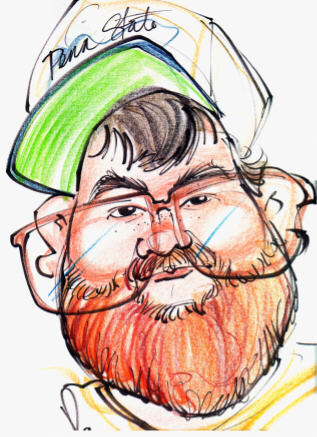PDL Chapter 2 Discussion
For various reasons it wasn't until February 7th that my Bible Study group got around to discussing with some depth chapter 2 of The Purpose Driven Life. Those familiar with the book know this as the "Why was I put here?" chapter. Despite some prayer, a lot of thinking, and the group discussion, I still don't have an answer for myself. But an interesting comment was made by group leader Paul: "Some of us are here to receive love."
That's it. Nothing more. Just "some of us are here to receive love." Could it really be that simple? Going through life up to this point I've always sought a reason that is proactive and productive. It is amazing to think that a purpose might not be to create or to give but to merely take or accept.
Perhaps my reticence to this proposition comes from my desire to be more of a giver than a receiver. For example, I have several weeks worth of dishes piled up in my kitchen but if a friend or neighbor were to call up and ask me to do their dishes I wouldn't hesitate. I would rather do for others than for myself. More to the point, this includes love.
In my quest to find another wife my goal is far less about being loved than loving another. When I was married I didn't really feel love despite the myriad of expressions and nuances that made the intent clear, but my married joy came from giving love so it didn't matter. My purpose was give, not recieve..
Then I guess it is possible for someone's purpose is to be loved rather than to give love, yet the concept still seems too simplistic and I think that is because it is limited to one purpose. I can't imagine any person having just one reason for being. In this respect I feel that PDL chapter 2 is a bit limited. It seeks to find the spiritual equivalent of the Unified Field Theory when it should concentrate more on the obviously structured composition of purpose.
Just as a person's behavior and personality change to at least a small extent depending on who they are interacting with, a person's purpose changes under similar circumstances. In examining the role of 'father' it is clear that the individual is by turns or simultaneously, a teacher, judge, and companion, among other purposes. The father role then can be seen as a meta-purpose or a an administrative description for many functions.
It is that meta-purpose that PDL chapter 2 seeks for each of us. To discover my meta-purpose I need to do several things. First, a fresh inventory of my skills, gifts, and needs is required. Second, I should pray for additional guidance and wisdom from the Lord. What does He want my primary purpose to be and what intermediate purposes need I fulfill to complete the whole? Since effectively abandoning my quest to become a full-time teacher I have struggled with these questions and PDL chapter two has merely added kindling to the burning questions.
That's it. Nothing more. Just "some of us are here to receive love." Could it really be that simple? Going through life up to this point I've always sought a reason that is proactive and productive. It is amazing to think that a purpose might not be to create or to give but to merely take or accept.
Perhaps my reticence to this proposition comes from my desire to be more of a giver than a receiver. For example, I have several weeks worth of dishes piled up in my kitchen but if a friend or neighbor were to call up and ask me to do their dishes I wouldn't hesitate. I would rather do for others than for myself. More to the point, this includes love.
In my quest to find another wife my goal is far less about being loved than loving another. When I was married I didn't really feel love despite the myriad of expressions and nuances that made the intent clear, but my married joy came from giving love so it didn't matter. My purpose was give, not recieve..
Then I guess it is possible for someone's purpose is to be loved rather than to give love, yet the concept still seems too simplistic and I think that is because it is limited to one purpose. I can't imagine any person having just one reason for being. In this respect I feel that PDL chapter 2 is a bit limited. It seeks to find the spiritual equivalent of the Unified Field Theory when it should concentrate more on the obviously structured composition of purpose.
Just as a person's behavior and personality change to at least a small extent depending on who they are interacting with, a person's purpose changes under similar circumstances. In examining the role of 'father' it is clear that the individual is by turns or simultaneously, a teacher, judge, and companion, among other purposes. The father role then can be seen as a meta-purpose or a an administrative description for many functions.
It is that meta-purpose that PDL chapter 2 seeks for each of us. To discover my meta-purpose I need to do several things. First, a fresh inventory of my skills, gifts, and needs is required. Second, I should pray for additional guidance and wisdom from the Lord. What does He want my primary purpose to be and what intermediate purposes need I fulfill to complete the whole? Since effectively abandoning my quest to become a full-time teacher I have struggled with these questions and PDL chapter two has merely added kindling to the burning questions.
I cry out to God Most High,
to God, who fulfills {his purpose} for me (Psalm 57:2).


0 Comments:
Post a Comment
<< Home